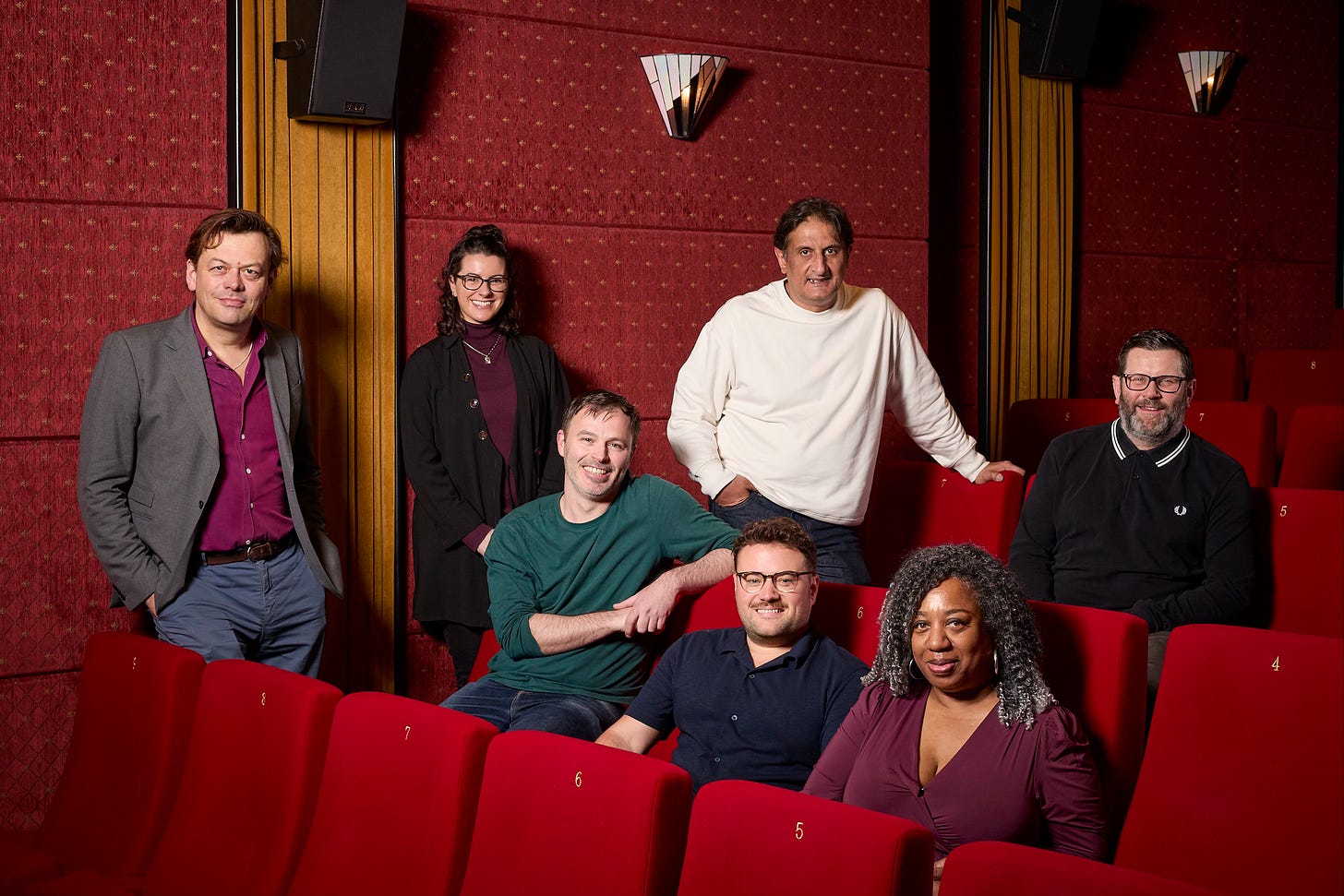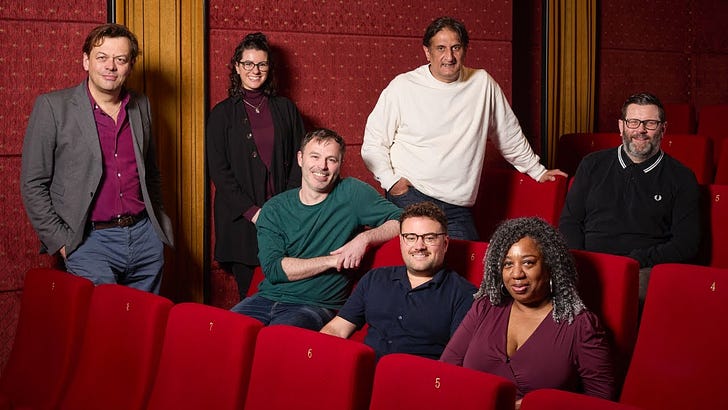Dramatists gather as Joe Ward Munrow named first Robert Holman Award recipient
From the rise of AI to the importance of the UK's regions, leading dramatists discuss the current writing landscape
To mark World Theatre Day, the RLF invited dramatic writers Ishy Din, David Eldridge, Juliet Gilkes Romero, Simon Stephens, Sameera Steward, Joe Ward Munrow and Joe White to talk about some of the challenges facing today’s dramatists. Watch the video in full below, or read on for our summary.
“It's really tricky, and it feels like it's getting trickier,” says Joe Ward Munrow – recipient of the inaugural Robert Holman Award, created in honour of the British dramatist and RLF beneficiary Robert Holman – when talking about the current landscape for dramatic writers in the UK.
Ward Munrow was speaking during our recent Dramatic Writers Discussion, chaired by RLF Trustee Mark Lawson and held at The Garden Cinema in Holborn ahead of this year's World Theatre Day. Also taking part were playwrights and founders of the Friends of Robert Holman David Eldridge and Simon Stephens; TV screenwriter Sameera Steward and playwright Joe White, both recipients of the RLF's JB Priestley Award; RLF Fellow and Royal Court Associate Playwright Ishy Din; and RLF Fellow, playwright and screenwriter Juliet Gilkes Romero.
“I think something big has got to change in the arts.”
Simon Stephens, playwright
In a wide-ranging conversation that covered topics including the importance of regions outside London to the future of theatre, the potential impact of AI on writers, the roll-back of diversity initiatives, financial instability and commercialism. This group of dramatic writers were frank about the challenges, with Simon Stephens saying “I think something big has got to change in the arts.”
There was discussion about how to create the change that is needed. “I wonder if it's a move away from professionalism. I wonder if it's about ensemble. I wonder if it's about amateurism. I wonder if it's about owning that and turning away from the possibility of just making money,” Stephens continued.

Ward Munrow spoke about the need for regions like Liverpool, where he is based, to build their own networks and put new work on – something Juliet Gilkes Romero echoed when talking about her work with HighTide, a writer-centred theatre company in the East of England: “We go out into the communities and form links and networks,” she said. For Joe White, too – who is from Birmingham and whose career began when he joined the Birmingham Rep’s artist development programme Foundry – regional theatre is hugely important. “Writing to and where you’re from feels significant,” he said.
Stephens also spoke about his faith in the UK's regions as being central to the future of the arts in the UK. “There'll be places like Middlesborough. There'll be places like Bognor. It'll be the towns that the real next generation of creativity could come from.”
“There are two things humans can do: tell stories and cook.”
Juliet Gilkes Romero, RLF Fellow, playwright and screenwriter
But in order to nourish that creativity, there are undoubtedly factors to address. Middlesborough's own Ishy Din spoke of the knock-on effects of the hiring decisions made by arts organisations in terms of changing (or not changing) the broader cultural landscape, while White talked about the impact of dwindling budgets on theatres across the UK. “As money starts to drain away, and risks are taken less and less, that's the worry,” he said.
Gilkes Romero spoke about how a lack of money is also making it harder for regional productions to be seen, and to make their way into London. “Finding the money now to go and travel and see – it's so, so difficult. We then have to encourage these pieces into London. And that is a problem. Everyone's become really protectionist,” she said.
Financial instability is also impacting screenwriters, with producers less likely to take on original work – something that the use of AI tools has made even more of a concern, as Sameera Steward outlined. "Everything is so IP-driven anyway, and they're not really taking scripts that are original," she said.
Sameera's own journey shows how challenging the industry is, even without the advent of AI, and especially for people of colour. “When I was starting, it was about 15 years ago,” she explained. “And I had to pretend to be a different person in order to get the script even read. So I had to pretend to be my stepdad, and I had to write as somebody called Paul Purchase – it was 10 years of me trying to hustle just to get a story read by people.”
David Eldridge also pointed to the ways in which decisions made by other people can have a huge impact on a writer's life. “It's an industry that's dependent upon the curatorial choices of someone else, whether they're an artistic director or a commissioner on a TV channel,” he said. His way of coping with this uncertainty is “to just try and write well; try and stay sane.”
“I have incredible faith in humanity. I write from humanity.”
Ishy Din, RLF Fellow and Royal Court Associate Playwright
But despite the challenges of today's writing landscape, the discussion was also full of optimism, mutual support and a deep appreciation of the writers' craft. “There are two things humans can do: tell stories and cook,” as Gilkes Romero said. “We know that the arts is absolutely vital to who we are.”
Din, who was a taxi driver before becoming a full-time playwright, said: “I worked out that I'd had 16,000 random conversations. Wow. So I have incredible faith in humanity. I write from humanity.”
“Playwrights are generally genuinely mutually supportive of one and other,” Stephens added, bringing things back to the source as the discussion came to a close. “And there's very, very few playwrights I've worked with more supportive than Robert Holman.”
Watch the full discussion on our YouTube channel.
What do you think? Leave us a comment below to join the conversation.
You can also visit our website for further information about the Robert Holman Grant Award, which supports professional playwrights who come from or are based in the North of England.





Great stories in the Youtube video